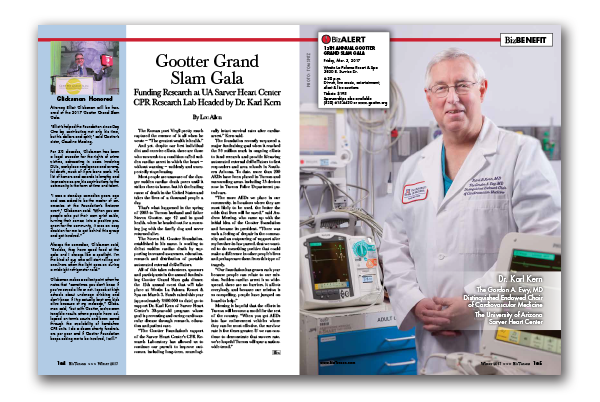
Gootter Grand Slam Gala
By Lee Allen –
Funding Research at UA Sarver Heart Center CPR Research Lab Headed by Dr. Karl Kern
The Roman poet Virgil pretty much captured the essence of it all when he wrote − “The greatest wealth is health.”
And yet, despite our best individual diet and exercise efforts, there are those who succumb to a condition called sudden cardiac arrest in which the heart − without warning − suddenly and unexpectedly stops beating.
Most people are unaware of the danger sudden cardiac death poses until it strikes close to home, but it’s the leading cause of death in the United States and takes the lives of a thousand people a day.
That’s what happened in the spring of 2005 to Tucson husband and father Steven Gootter, age 42 and in good health, when he headed out for a morning jog with the family dog and never returned alive.
The Steven M. Gootter Foundation, established in his name, is working to defeat sudden cardiac death by supporting increased awareness, education, research and distribution of portable automated external defibrillators.
All of this takes volunteers, sponsors and participants in the annual fundraising Gootter Grand Slam gala dinner, the 12th annual event that will take place at Westin La Paloma Resort & Spa on March 3. Funds raised this year (approximately $400,000 to date) go to support Dr. Karl Kern of Sarver Heart Center’s 30-year-old program whose goal is preventing and curing cardiovascular disease through research, education and patient care.
“The Gootter Foundation’s support of the Sarver Heart Center’s CPR Research Laboratory has allowed us to continue our pursuit to improve outcomes, including long-term, neurologically intact survival rates after cardiac arrest,” Kern said.
The foundation recently surpassed a major fundraising goal when it reached the $4 million mark in ongoing efforts to fund research and provide lifesaving automated external defibrillators to first responders and area schools in Southern Arizona. To date, more than 200 AEDs have been placed in Tucson and surrounding areas, including 75 devices now in Tucson Police Department patrol cars.
“The more AEDs we place in our community, in locations where they are most likely to be used, the better the odds that lives will be saved,” said Andrew Messing, who came up with the initial idea of the Gootter Foundation and became its president. “There was such a feeling of despair in the community and an outpouring of support after my brother-in-law passed, that we wanted to do something positive that could make a difference in other people’s lives and perhaps save them from this type of tragedy.
“Our foundation has grown each year because people can relate to our mission. Sudden cardiac arrest is so widespread, there are no barriers, it affects everybody, and because our mission is so compelling, people have jumped on board to help.”
Messing is hopeful that the efforts in Tucson will become a model for the rest of the country. “When you get AEDs into law enforcement vehicles where they can be most effective, the survivor rate is five times greater. If we can continue to demonstrate that success rate, we’re hopeful Tucson will spur a nationwide trend.”





